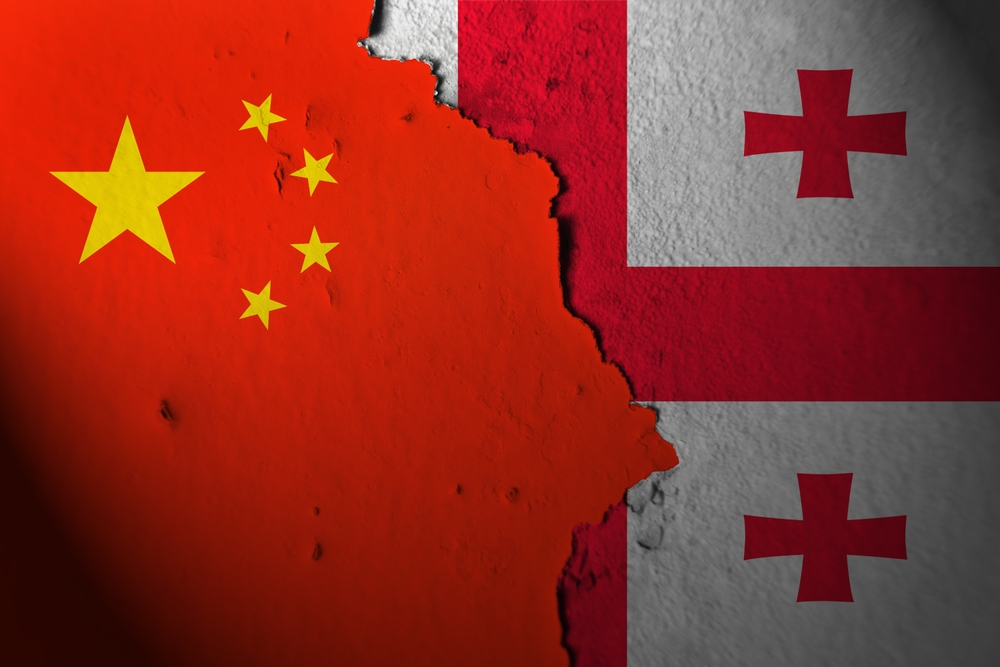China–Georgia Relations:
A New Move on the Chessboard?
Anna Dolidze
(Associate Professor, Rabdan Academy)
March 8, 2024
New Developments and their Context
On January 14, 2024, at the start of the new year, a high-level political delegation from Georgia’s ruling Georgia Dream party left for an official trip to China. According to officials, the trip is connected to implementation of the Middle Corridor concept, where China is the main stakeholder. Georgia is a proponent of the Middle Corridor Initiative, a transport corridor connecting China to Europe. The objective of the corridor is to serve as the quickest route between China and Europe, requiring only 15 days. Although the concept has existed for a certain period of time, the idea of the Middle Corridor gained strength as the northern route of transportation through Russia encountered hurdles due to the Russia-Ukraine war.
The visit garnered extensive media attention and has been favorably commented upon by Chinese officials as well. China’s activity in Georgia is not new: Chinese investments have been active in Georgia for quite some time. Georgia has been an active participant in the Belt and Road Initiative, while Chinese firms have been active in Georgia. Georgia was the very first Eurasian country to sign a Free Trade Agreement with China. The negotiations, which started in 2015, were swiftly completed and the Agreement was signed in 2017. Georgia also hosts a widely attended Tbilisi Silk Road Forum.
Nevertheless, the high-level delegation visit is the first since Georgia and China signed a Strategic Partnership Statement in the summer of 2023. The visit represents a step in the direction of implementation of the Strategic Partnership Statement, and highlights a new milestone in the Georgia–China relationship. Indeed, as noted in the Joint Statement of the leaders of both states, “The two sides decided to elevate bilateral relations to a strategic partnership.” Nevertheless, the meaning of the strategic partnership is vague and has yet to assume concrete configurations.
Strategic Partnership: Distinct but just One of Strategic Hedging?
It seems that the high-level strategic partnership with China is a new dimension for Georgia’s foreign policy. The statement is distinct as it goes beyond the established field of cooperation with China in the realm of economy, and includes politics, culture, and international governance. None of Georgia’s foreign policy documents, including the Foreign Policy Strategy or the National Security Strategy, mention deepening relationship with China as a priority. For instance, the National Security Concept outlines normalizing relations with Russia as a priority as well as deepening relations with NATO, the EU, South Caucasus countries, the United States, Ukraine, and Turkey. It mentions relations with China only in passing, among the list of all other countries, alongside Japan, South Korea, Israel, etc. Moreover, the language of relations with China focuses primarily on economic relations and trade, notably, “Georgia attaches great importance to deepening political dialogue and economic relations with China, Japan, South Korea, Israel […] in order to foster trade and investment, and to generate international support to Georgia.”
In fact, Georgia’s Foreign Policy document adopted by Parliamentary Decree in 2020 reaffirms the language of the National Security Concept and notes that Georgia aims to increase its “strategic partnership” with the US as well as other Western European countries. Relations with China are mentioned alongside other countries, such as Israel and Japan, with the objective to “deepen trade and people’s relations.” And in fact, when questioned in the Parliament on whether deepening of strategic partnership with China impacts Georgia’s foreign policy priorities, the Minister of Foreign Affairs noted that the priorities have not changed.
The Strategic Partnership Statement includes new issues in the relationship including the quest for Georgia to share the Chinese approach to modernization and governance, as well as to engage in political consultations. It also notes that Georgia supports China’s Global Security Initiative and Global Civilization Initiative, as well as an ambiguous phrase that Georgia and China aim to build a “new type of international relations.” It also points to plans in the realm of deepening cultural relations, including language instruction, cultural, scientific, and educational exchanges, and sharing of scientific knowledge. Moreover, Prime Minister Garibashvili’s visit to China in July 2023 was the first ever visit of the Georgian high-level dignitary to the People’s Republic, signifying the importance of the relationship. As a gesture of the actual implementation of the strategic partnership, Georgia abolished visas for Chinese citizens.
The policy of approximation with China seems to be part and parcel of the relatively recent multi-vector policy adopted by the government, that emerged after the start of the Russia-Ukraine war. Pronounced in political speeches, yet not in concept papers, the policy aims to downplay the significance of Georgia’s relations with the West, while strengthening its outreach to other powers. This shift is noticeable, in particular, in the Georgian government’s move in relation to economic relations and tourism. Therefore, the closer ties to China, that came to prominence since 2023, seem to be part of Georgia’s exercise in strategic hedging.
Beyond the Diplomatic Partnership? China in a Regional Dynamics
However, the main question here is whether the newly established strategic partnership will actually materialize in pragmatic outputs, such as actual programs, investment and trade deals, or sector-specific treaties. Up until recently, although China and Chinese businesses have been active in Georgia, the curve has not been upward. Both business and academic ties have remained at stable, yet moderate levels. China is Georgia’s third largest trade partner, yet this is true for most Western European countries as well. The presence of Chinese construction companies, as well as investment in Georgia, has been stable over time. So, the question is whether the actual relationship with China will be transformed to the same extent that it has transformed on the diplomatic level.
One aspect to keep in mind here is certainly the role of other regional players and their outlook on the Caucasus. Historically, during last two centuries, Russia has considered Georgia as part of its “neighborhood” and has expressed its keen interest in remaining the dominant power in the region. The United States has been active in Georgia since Georgia’s independence and has invested considerably in Georgia’s development as well as in developing a strategic partnership. Georgia is now an EU candidate country, with the EU signaling its geopolitical interest as well as disbursing vast amounts of funds to support reforms in Georgia. Last but not least, the historical role of Turkey, a NATO member country and increasingly important geopolitical player, has to be considered as well, noting that Russia and Turkey were in active contestation over the Georgian territory prior to Georgia’s annexation by the Soviet Union in 1921. Therefore, even if China decided to further actively advance into Georgia as part of its quest for a new international role, this can only be done in light of other significant state interests in Georgia as well as in the Caucasus at large.
Dr Anna Dolidze was a member of the High Council of Justice in Georgia, the government body that oversees the judiciary, where she advocated for judiciary reform. Prior to her appointment to the Council, she was the Chief Legal Officer for the President of Georgia. In this capacity, she presented the record number of six Presidential vetoes to Parliament. In 2015–2016 Dr Dolidze was a Deputy Minister of Defense, where she was responsible for military education and veteran rehabilitation.
Dr Dolidze was previously Assistant Professor of Law at the University of Western Ontario. She combines academic, professional, and NGO experience, having worked with Save the Children, Human Rights Watch, and Project Harmony, and having served as Chairman for the Georgian Young Lawyers’ Association (GYLA), the largest advocacy organization in Georgia.
Dolidze has been recognized as a Young European Leader by Atlantic Brucke, Global Woman Leader by the Middle East Excellence Institute and among twelve women globally as Women on the Barricades by the Norwegian Helsinki Committee.
Dr Dolidze lectures transnationally, including at Duke University in North Carolina, Helsinki España-Human Dimension in Madrid, Sorbonne University in Paris, and Elmira Maximum Security Correctional Facility in New York State. She is the author of three books and numerous scholarly articles about international law and the rule of law.


